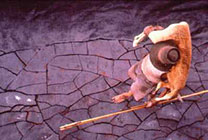|
|
|
|
Bedevil
|
 |
|
Bedevil, the first and (to date) only feature-length film by the celebrated Australian artist Tracey Moffatt, was part of a brave but difficult public experiment within Australian cinema culture at the start of the '90s. Key visual artists, long-established avant-gardists and some writer-critic-theorists were encouraged – and, more crucially, funded out of government coffers – to make boldly innovative features. Apart from Bedevil, the other films that issued from this short-lived experiment were Ross Gibson's Dead to the World (1991), Susan Dermody's Breathing Under Water (1992), David Perry's The Refracting Glasses (1992) and Laurie McInnes' Broken Highway (1993). Bedevil fulsomely displays those hybrid, suspended, between-worlds qualities so characteristic of Moffatt's art: it is a trio of ghostly tales, based on stories the she heard as a child, which enact uncanny, disquieting moments of contact between the living and the dead, between the past and the present, and between black and white Australia. There are images in the film of a high-wire, spinning suspension (the final overhead shot of teenage skaters circling a car); an abject sense of repressed presences returning from the murk and smearing the unsuspecting living (like the mud ghost of the opening story); attempts at magical lyricism (the dancing ghosts and their eternal, violent passion) and the thickly painted atmosphere of an uncanny, disturbed everyday, whether in the bush, beach or suburbs. Yet there is also much humour in the film: Moffatt milks her very particular brand of political comedy from the contagion of incongruities and crossed-wires created by a burgeoning multi-cultural society: the film canvasses a veritable diaspora of Europeans and Asians living and improvising in the land of Oz. Yet, for me, Bedevil is overly schematic and pre-programmed. There is an excessive obliqueness, a bloodlessness hovering over proceedings, as if Moffatt has distanced herself way too far from the vulgarities of sex, violence and fiction. That frisson of social-personal transgression, for once, is missing. Maybe Moffatt is one of those artists – like some of the old American film directors discovered by the French auteurists of the '50s – who would be better off not listening too closely to her critical admirers and exegetes. MORE Moffatt: Nice Coloured Girls, Night Cries: A Rural Tragedy MORE Australian indigenous films: Black Chicks Talking, Whispering In Our Hearts, Beneath Clouds, The Tracker, Ten Canoes, Rabbit-Proof Fence © Adrian Martin 1993/1999 |
![]()